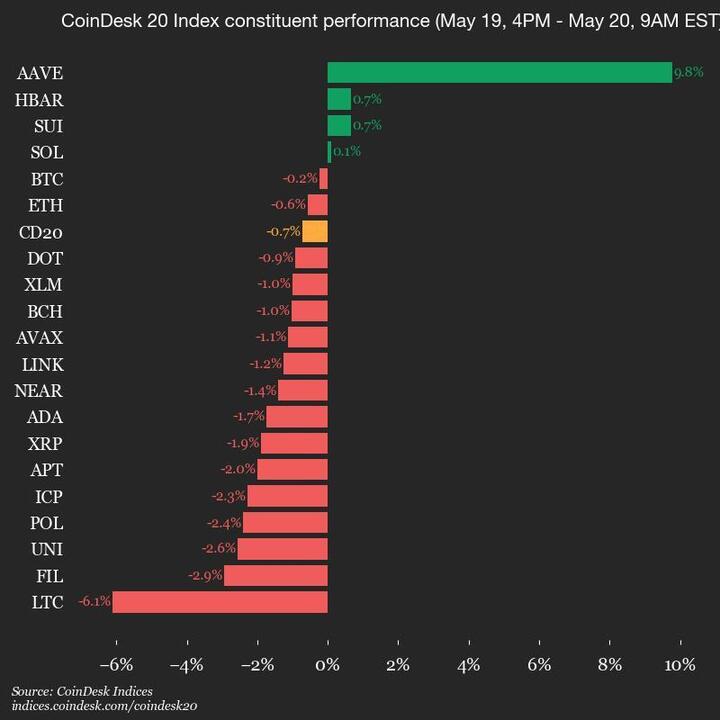Uncategorized
KULR Technology Buys Another 56 Bitcoin for $5M, Takes Holdings to 668 BTC

KULR (KULR) a leader in advanced energy management has acquired an additional $5 million worth of bitcoin (BTC).
The latest purchase was made at an average price of $88,824 per bitcoin, increasing the company’s total holdings to 668.3 BTC, per the announcement from CEO Michael Mo. This move is in line with KULR’s bitcoin treasury strategy, first announced in December, which allows for up to 90% of its surplus cash reserves to be held in bitcoin.
The company stack was purchased for about $65 million, or an average price of $97,305 per token. It’s worth just above $58 million at bitcoin’s current price in the $87,000 area.
Year to date, KULR has achieved a bitcoin yield of 181.1%, according to Mo, utilizing a mix of cash and its at-the-market (ATM) equity program to fund acquisitions. The bitcoin yield is a key performance indicator (KPI) for the company, calculated by assessing the percentage change period over period in the ratio of bitcoin holdings to KULR’s assumed fully diluted shares outstanding. This metric reflects the company’s efficiency in increasing BTC exposure relative to shareholder dilution.
KULR stock is trading 3.5% higher in the pre-market session.
Disclaimer: Parts of this article were generated with the assistance from AI tools and reviewed by our editorial team to ensure accuracy and adherence to our standards. For more information, see CoinDesk’s full AI Policy.
Uncategorized
True Markets Raises $11M in Series A, Launches Mobile-First DeFi Trading App on Solana

True Markets, a new decentralized finance (DeFi) trading platform focused on stablecoin-native execution, has launched its mobile app on Solana and closed an $11 million Series A, bringing total funding to $20 million, the company said in a press release Tuesday.
The funding round was co-led by Accomplice and RRE Ventures, with participation from Reciprocal Ventures, Variant Fund, and PayPal Ventures.
Seed investors Paxos Ventures and the Solana Foundation, continue to support the firm, True Markets said.
Founded by Coinbase (COIN) and Circle veterans Vishal Gupta and Patrick McCreary, New York-based True Markets aims to deliver a non-custodial, mobile-first DeFi trading experience for retail users, prioritizing speed, simplicity, and transparency.
The app enables stablecoin-powered token trading on Solana, with gasless execution, smart order routing, and embedded key management via Turnkey, all without users surrendering custody of funds, True Markets said.
“Retail traders have been stuck with clunky workflows, unclear pricing, and fragmented liquidity,» said Vishal Gupta, CEO of True Markets, in the release.
«Our goal is to deliver a fairer and more transparent experience that makes asset discovery simple, shows real-time market momentum, and feels as intuitive as the best apps on your phone,» Gupta added.
Backed by infrastructure partners Turnkey and Definitive, the app features real-time market sparklines, automated execution across decentralized venues, and hosted wallets that support immediate funding and trading within a non-custodial framework.
True Markets said it plans to expand into both CeFi and DeFi markets, with future integrations including TrueX, a centralized exchange designed for institutional liquidity and qualified custody.
Disclaimer: Parts of this article were generated with the assistance from AI tools and reviewed by our editorial team to ensure accuracy and adherence to our standards. For more information, see CoinDesk’s full AI Policy.
Uncategorized
CoinDesk 20 Performance Update: Litecoin (LTC) Drops 6.1%, Leading Index Lower

CoinDesk Indices presents its daily market update, highlighting the performance of leaders and laggards in the CoinDesk 20 Index.
The CoinDesk 20 is currently trading at 3147.53, down 0.7% (-22.88) since 4 p.m. ET on Monday.
Four of 20 assets are trading higher.

Leaders: AAVE (+9.8%) and HBAR (+0.7%).
Laggards: LTC (-6.1%) and FIL (-2.9%).
The CoinDesk 20 is a broad-based index traded on multiple platforms in several regions globally.
Uncategorized
KULR Boosts Bitcoin Treasury to 800 BTC With $9M Purchase

Energy management firm KULR (KULR) has expanded its bitcoin treasury to more than 800 tokens, with the purchase an additional $9 million worth of BTC.
The latest acquisition — made at an average price of $103,234 each — brings the total amount KULR has spent on the cryptocurrency to $78 million.
This continues the company’s treasury strategy first announced in December last year, under which it committed to holding up to 90% of its surplus cash reserves in bitcoin.
The Houston-based firm, which develops energy storage systems for aerospace and defense, is measuring the success of this pivot using a BTC Yield metric.
That metric tracks the growth in the ratio of bitcoin holdings to the number of shares outstanding, rather than actual dollar returns or revenue. So far in 2025, KULR says that ratio has jumped by 220, according to this morning’s press release.
KULR’s shares are up 3.15% in pre-market trading at $1.3.
-

 Fashion7 месяцев ago
Fashion7 месяцев agoThese \’90s fashion trends are making a comeback in 2017
-

 Entertainment7 месяцев ago
Entertainment7 месяцев agoThe final 6 \’Game of Thrones\’ episodes might feel like a full season
-

 Fashion7 месяцев ago
Fashion7 месяцев agoAccording to Dior Couture, this taboo fashion accessory is back
-

 Entertainment7 месяцев ago
Entertainment7 месяцев agoThe old and New Edition cast comes together to perform
-

 Business7 месяцев ago
Business7 месяцев agoUber and Lyft are finally available in all of New York State
-

 Sports7 месяцев ago
Sports7 месяцев agoPhillies\’ Aaron Altherr makes mind-boggling barehanded play
-

 Entertainment7 месяцев ago
Entertainment7 месяцев agoDisney\’s live-action Aladdin finally finds its stars
-

 Sports7 месяцев ago
Sports7 месяцев agoSteph Curry finally got the contract he deserves from the Warriors





